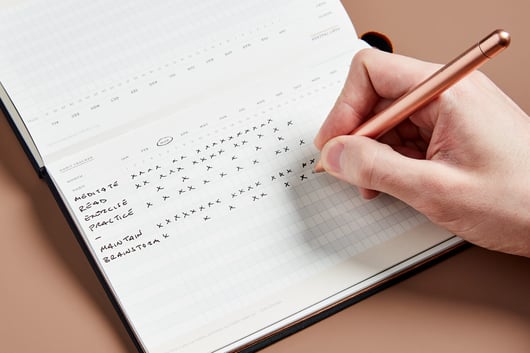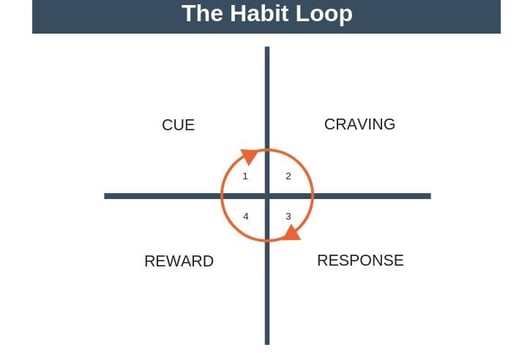
On the importance of building healthy habits
When we’re too fixated on the outcome
Be honest with yourself. Do you sometimes focus too much on the future? Do you have a goal in mind and feel tense until you have achieved it? If you’re into wellness and healthy living, you’re probably into building good habits too.
Say you want to reach a certain weight in the next two months. At first, you might feel excited about the prospect of getting to the place where you want to be. We all know how it goes. Often you start with the intention of “being good” – you skip meals, eat lots of apples, exercise every day… until you fall off the wagon. You’ve stuffed your face with a massive burger with fries and a cake and now you feel demotivated. You feel horrible physically but even worse mentally.
The next day you intend to eat only fruits until hunger hits you so hard that by the end of the day you’re ravenous and you binge on all the foods … again. You now feel like a total failure. Then you go into detox mode for the next few days until you binge again: a vicious cycle.
I used to beat myself up so much in the belief that if I’m strict with myself, I’ll get more things done. I didn’t realise that I was shooting myself in the foot that way.
This constant waiting for things to happen in a specific way was making me tense and, ironically, less likely to do well in the end.
Habits and automating things
Learning how to build habits has been a huge part of my wellness journey.
Something dramatically shifted once I came across a concept on the Tim Ferriss Show – the importance of habits and automating things. The guest on his podcast, James Clear, shared his philosophy that by automating as much as we can, we can free up space for all the other things in your life.
We have a finite amount of willpower and decision-making capacity on any given day. Therefore, we have to be smart about where we spend it. Automating everything predictable such as our breakfast or how we start our days saves brain capacity for more important decisions that we need to make throughout the day. If we have routines, we only need to figure out what happens outside of these ‘fixed’ actions
What is a habit?
If we simplify it, a habit is:
Something that happens as a result of the actions that we take over and over again
A network of connections between neurons inside your brain, which forms a path that has already been marked out.
The biggest benefit of building habits is that we don’t have to think about things as much. They have already been remembered by our brain through constant repetition. Motivation and willpower are much less powerful than something that you do by default. Because our brains are super-efficient and they just like to do things they know how to do.
James Clear ’s philosophy - systems over goals
James Clear’s framework is all about getting 1% better every day, accumulating improvements over time and reaping the benefits that work like compound interest.
Some of my favourite quotes by James Clear:
“When you fall in love with the process rather than the product, you don’t have to wait to permit yourself to be happy. You can be satisfied anytime your system is running.”
“Every action you take is a vote for the type of person you wish to become. No single instance will transform your beliefs, but as the votes build up, so does the evidence of your new identity.”
“Goals are good for setting a direction, but systems are best for making progress.”
James Clear’s bestseller Atomic Habits is so inspiring. I’m reading it for the fourth time because it breaks down the habit formation process and gives you simple everyday tips.
James Clear proves that you can form any good habit you wish to attain if you’re consistent. It also applies to bad habits. You can unlearn unhelpful behaviour if you’re consistent.
When you focus on systems over outcomes, you can completely reshape your lifestyle. Whether it’s quitting smoking, losing weight, reducing stress, or achieving any other goal, everything is possible if you don’t give up on the little steps you take daily.
Habit formation includes a few elements that matter: our environment, combining mini habits to create bigger ones (habit stacking), positive reinforcement and tracking our progress.


We, as humans, are creatures that like pleasure and instant gratification. It’s one of the reasons it’s so tempting to have cheat days. If there is something very
tempting in the present moment, it’s easy to grab it and ignore the goal we have in mind. When what we want to achieve is somewhere far in the future, the prospect of the immediate reward is almost screaming at us.
Since we’re wired to seek pleasure, it makes sense to give ourselves rewards that reinforce good behaviours. A simple way to reward our consistency is by using a habit tracker. I’m using a simple log where I put the days of the month, a description of the habit I’m tacking and boxes that I can tick off every day.
If I’m having a bad day and I’m not in the mood for meditating, exercising, stretching, or whatever it is I want to be doing, I simply look at my tracker. I then see the progress I’ve already made. Even if I’m feeling down on that day, I almost always push myself to do it again (even if it’s for 5 min). It’s so satisfying to see a strike of 20 days in a row. I know that even if I fall off the wagon, I’m unlikely to do it more than one day in a row. I wouldn’t want to lose my progress by breaking my streak
When we get the signal that we are moving forward, we become more motivated to continue down that path. In this way, habit tracking can have an addictive effect on motivation. Each small win feeds your desire. James Clear
The importance of our environment
Most of us would like to think that our habits follow our intentions. But we all know that it’s not how it always works.
Say you desperately want to lose weight and you intend on being strict with your nutrition. You’re eating your greens and you’re reducing your portion sizes.
However, you have a big plate of cookies on your table staring at you. Are you not going to help yourself to a few wherever you look at them? Yeah, me too.
You’re so much more reliant on environmental triggers than you’d like to think. Research shared in books like Mindless Eating show how tiny changes in our environment can substantially impact your behaviour:
If you use a big spoon, you’ll eat more.
If you serve yourself on a big plate, you’ll eat more.
If you eat chicken wings and remove the bones from the table, you’ll forget how much you ate and you’ll eat more.
The good thing is that if you design an environment that can support your goals and systems.
You can put your gym clothes next to your bed, so you see them first thing in the morning
You can have a few bottles of water placed around your house You can fill your fridge with vegetables
You can set your phone to an automated ‘bed mode’, so it limits your activity after a certain time in the day
There’s just one way to radically change your behaviuor: radically change your environment. - Dr. B.J. Fogg, Director of Stanford Persuasive Lab


Habit stacking
Our brains are highly efficient and like to build a strong network of neurons to support our current behaviours. It remembers simple behaviours like the fact that we brush our teeth and have a shower. When we want to develop more new habits, it’s very helpful if we connect them to existing ones. The formula is: “After/Before [CURRENT HABIT], I will [NEW HABIT].”
This is called ‘habit stacking’.
Here are some examples James Clar has outlined:
After I pour my cup of coffee each morning, I will meditate for one minute. After I sit down to dinner, I will say one thing I’m grateful for that happened today.
After I put on my running shoes, I will text a friend or family member where I am running and how long it will take.
The reason this works so well is that your brain already has many patterns embedded in the tears. When we link new habits to old ones, we’re more likely to stick to the new behaviours.
Tracking your habits: an easy way to keep going
Another action that helps is tracking the progress of your habits. It reminds you that it’s about the system, not the outcome.
When you have a habit tracker, this motivates you to continue. If you’re trying to exercise more and skip a day of running, you’re much more likely to continue when you see how many other days you’ve run.
The mos t effective form of motivation is progress - James Clear
Learning and unlearning habits
Habit formation goes both ways. We can form good habits and we can form bad habits. However, we can also unlearn those behaviours that don’t serve us anymore.
The four laws of breaking bad habits
How to build habits… really? We all have bad habits we’re constantly trying to get rid of. We can do it the same way we’ve created good ones.
So here is the inverse of the above – the four laws of breaking bad habits. Let’s use being on your phone right before going to sleep as an example.
1. Make it invisible — hide your phone, put it far away from your bed an hour before you intend to go to sleep
2. Make it unattractive — imagine how difficult it will be to fall asleep if you bombard yourself with so much information from your device . Make it difficult — set your phone on an aeroplane more or ‘sleep mode’ – my screen becomes black and white after 9 pm
Reframe the activity so it has negative connotations – think about the dark circles around your eyes if you stay up glued to your phone screen
Ultimately, James Clear says that we want to:
increase the number of steps between us and a bad habit
decrease the number of steps between us and a good habit
Tim Ferriss’s list of habits to break
Tim Ferriss is someone who loves exploring habits, morning and evening rituals, and he has interviewed many people about it. He’s all about optimising our performance in life and designing an optimal good lifestyle.
He’s written an article which I really like – about unlearning habits – The Not-To Do List: 9 Habits to Stop Now.
“Not-to-do” lists are often more effective than to-do lists for upgrading performance. The reason is simple: what you don’t do determines what you can do.
Tim’s list includes nine stressful and common habits that entrepreneurs and office workers should strive to eliminate such as:
Do not answer calls from unrecognised phone numbers
Do not agree to meetings or calls with no clear agenda or end time
Do not let people ramble
Do not check email constantly — “batch” and check at set times only
Do not over-communicate with low-profit, high-maintenance customers.
Do not work more to fix overwhelm — prioritise
Do not expect work to fill a void that non-work relationships and activities shoud
Baby steps - the way forward
Let’s recap what we’ve discussed so far:
Focussing on systems as opposed to goals is more likely to lead to success Forming habits is about becoming 1% better every day
Remember that our biology likes repetition
Learning and unlearning habits areequally important
Every action we take is a vote for the person we want to become Start small and keep going
Track habits to feel motivated and to stay on track
It’s okay to skip a day, but don’t skip too many in a row to keep your strike
I hope that after reading this, you’ll feel more optimistic about reaching your goals. Start small and don’t give up. You’ll get there before you know it. Enjoy the ride!
Sign up for the newsletter
Do you want to receive wellness content, pretty photos and marketing tips straight into your inbox?


